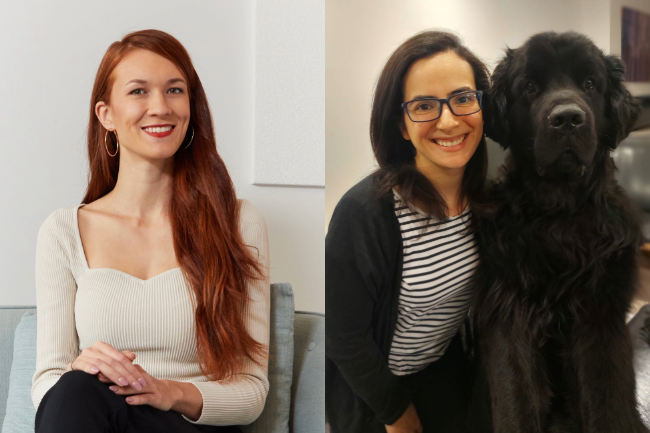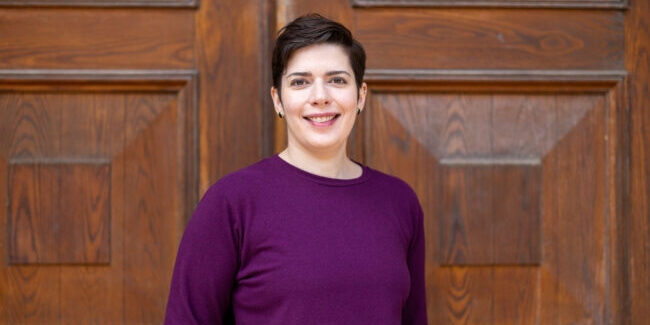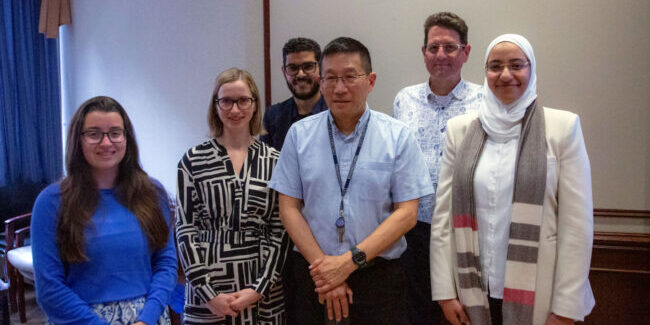When Laura Thompson (ChemE 1T6), was in her fourth year at U of T Engineering, a simple skincare hack sparked her journey into the world of natural skincare.
“One of my friends introduced me to using coconut oil as a natural makeup remover,” says Thompson, co-founder of Three Ships. “I loved how well it worked, but I found the user experience of scooping it out of a jar and applying it to my face to be bulky and cumbersome.”
Thompson started to research more natural skincare alternatives but was frustrated with companies making questionable claims about being natural and clean — a practice sometimes referred to as greenwashing — as well as a general lack of clarity and transparency around these terms.
“Three Ships was born out of our own frustration,” says Thompson, who, along with her co-founder Connie Lo, invested $2,000 into the creation of the company. “We started by hand-making our products in our kitchen. Our intention was to create truly natural skincare products that are affordable and deliver exceptional results.”
Today, Three Ships no longer makes its products in the co-founders’ kitchen. The company works with three factories in the Greater Toronto Area — and one in South Korea for their innovative biodegradable eye masks — to deliver mostly made-in-Canada products.
“One of the big advantages is that we’re able to have boots on the ground and go and visit our contract manufacturers to ensure quality control,” says Thompson.
“That’s why all our products that we can make locally are made locally. It was a huge decision for us to even start making products in South Korea, but there were no contract manufacturers here that could make that type of technology.”
For Sofia Bonilla (ChemE PhD 1T7), establishing a Canadian company with made-in-Canada products has been a positive experience due to the support she has received, including from U of T Mississauga’s ICUBE — a social entrepreneurship accelerator for early-stage startups.
“It’s incredibly difficult to build a business, so I won’t sugar coat it, but there have been so many people wanting to help us and see us succeed,” she says.
Bonilla is the founder and CEO of ALT-PRO Advantage, makers of next generation pet foods that use environmentally friendly, nutrient-rich insect protein.
Before becoming an entrepreneur, Bonilla spent her career in academia. Born and raised in Colombia, she completed a degree in microbiology before moving to Australia to complete a master’s degree in environmental science.
She then completed her PhD in chemical engineering at U of T and pursued postdoctoral fellowships in Toronto and the Netherlands.
“My expertise is in protein. For many years, I was thinking about protein, learning about protein and over time I came to understand the importance of diversifying where we get our protein,” she says.
“Combining my biology background with engineering helped me develop an understanding of manufacturing products. I realized I could use my scientific training to create products that people could buy, helping them transition to environmentally friendly, nutritionally equivalent alternative protein sources.”
ALT-PRO started using insect protein in pet foods due to its commercial availability, as well as its proven safety, palatability and digestibility.
“We see a lot of opportunity in other alternative proteins, and we are even developing our own ingredients that we plan to incorporate in the future using microalgae. We have these cool, proprietary ingredients that will be a source of essential nutrients for pets but also has different applications in other feed and food products,” says Bonilla.
“The company started with just me, but we are now a team of six with research and development based in Halifax. We also have products in 84 stores across Canada.”
Both ALT-PRO Advantage and Three Ships are Certified B Corporations, a designation from nonprofit network B Lab, which indicates that a company meets the highest standards in social and environmental performance, public transparency and legal accountability.
Building a business in Canada has its challenges, says Thompson, noting that accessing capital has been one of Three Ships’ biggest hurdles, especially since many investors and large venture capitalist firms are based in the United States.
But the company is now at the stage where it has a lot of Canadian visibility, she says. Their next goal is to continue expanding and get their products into a major beauty retailer.
“My biggest advice for women in engineering who are interested in pursuing entrepreneurship is to learn how to sell,” she says. “As a founder, you are always selling something: the culture of your team to new employees, the future growth potential to investors and your products to your customers and retail buyers.
“I wish that more women would go into a sales role right out of school and learn those skills before launching their companies. Connie and I both had sales backgrounds before we started, and we learned so much from those experiences, which serve us in entrepreneurship.”
If Bonilla could give her past self one piece of advice, it would be to have more confidence in her vision early on.
“I’m learning to not undersell accomplishments,” she says. “My advice to women interested in entrepreneurship is to trust and surround yourself with people who believe in you and your vision. Don’t be afraid to be authentic and change the way things have been traditionally done.”




